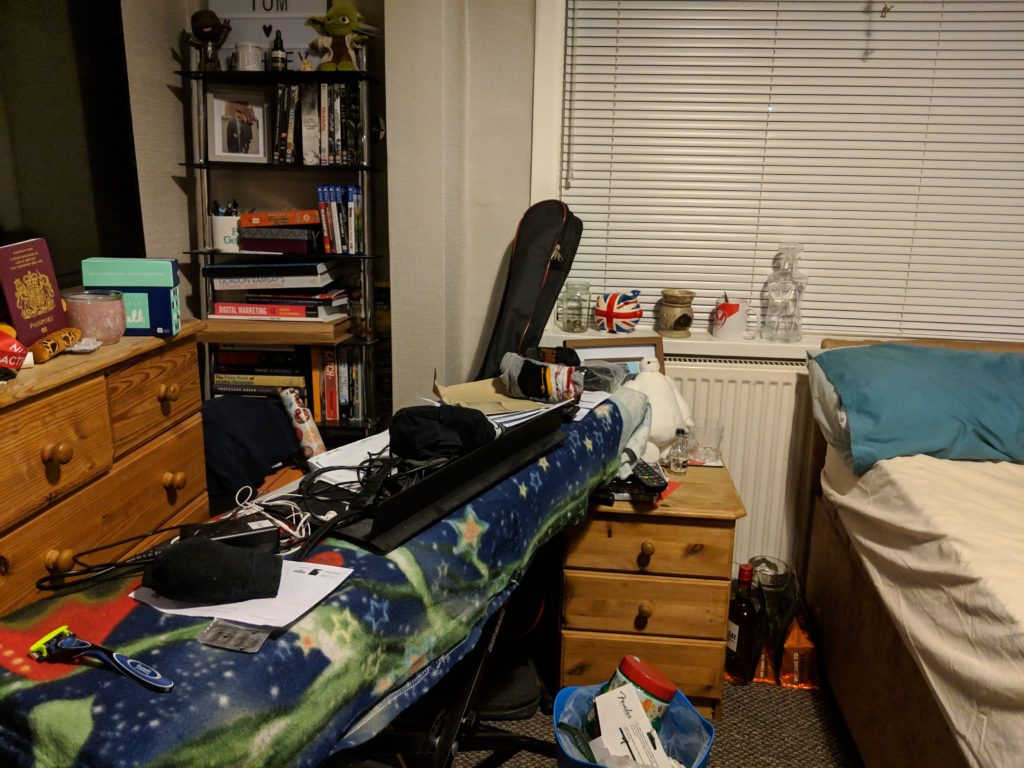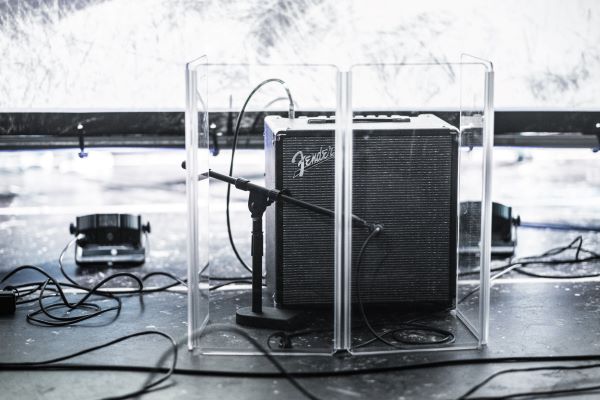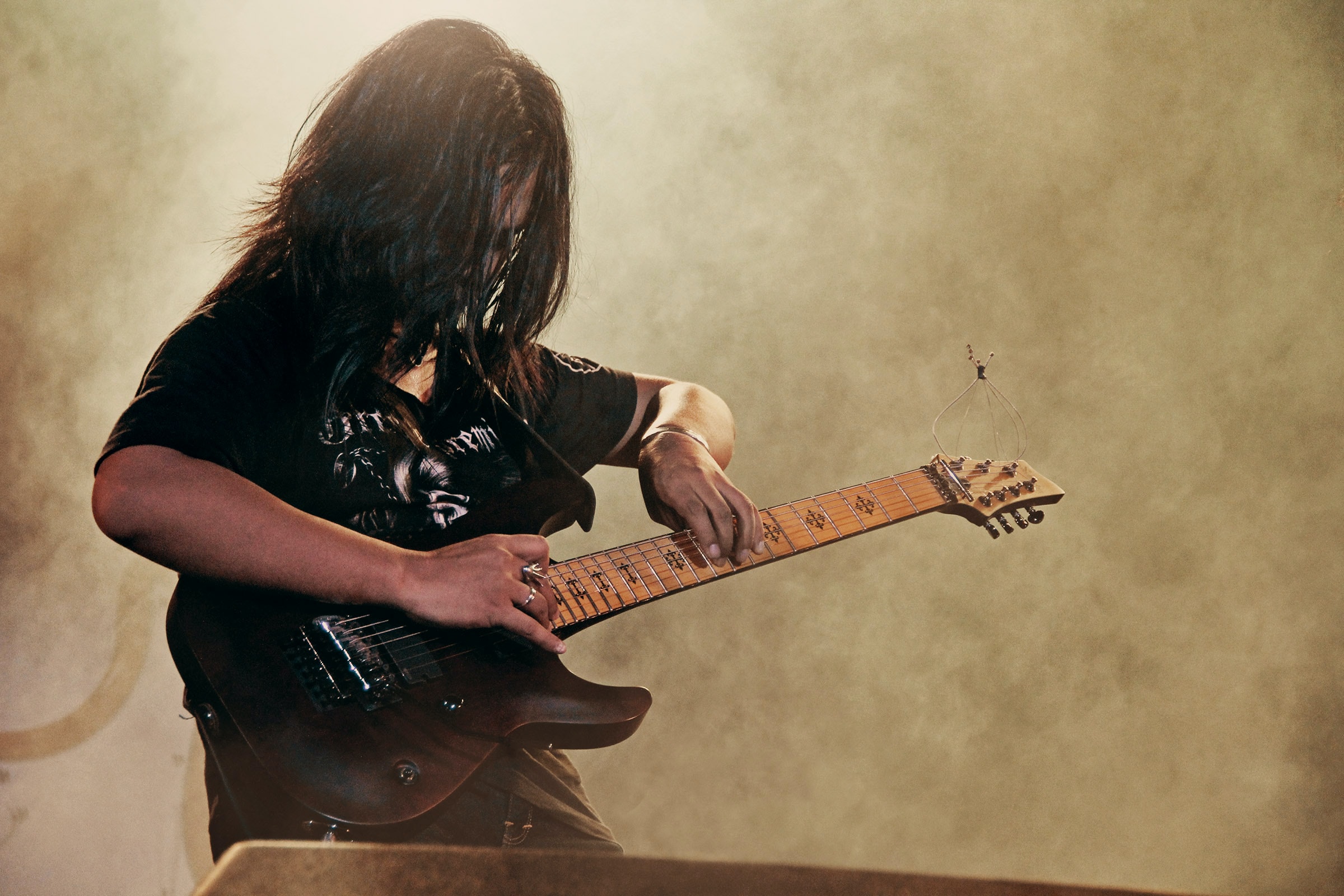Sometimes, metal guitar practise can feel like a chore or even downright disappointing as we are not reaching our goals as quickly as we would like – I know I’ve suffered from this before many times (I’m looking at you Afterlife by Avenged Sevenfold). But it doesn’t need to be this way…
Here are some top tips metal guitar practise tips that will accelerate developing your skills and playing:
TUNE YOUR GUITAR
I’ve been playing guitar for only a handful of years, but you wouldn’t believe the amount of people I see playing with out of tune guitars! There are many great guides out there on how to do this.
The reason that this is crucially important is that an out of tune guitar can hamper your ear development. Over the course of your playing, your ear will recognise the note you are playing as correct – even if your guitar is only slightly out of tune.
Tuning your guitar just before playing is such a simple thing to do and it only takes a couple minutes if you have a tuner handy (very recommended!). Some more “old-school” players swear that tuning by ear is the key to becoming a successful guitarist, to which I say RUBBISH!! There are so many ways that you can easily tune your guitar such as pedals, clip on tuners and amps. Make tuning your guitar a pre-warm up routine.
Also… while we’re on the subject of tuning strings – make sure your strings aren’t dulled by extensive playing. If you need a fresh set of strings, just replace them! You, your guitar and your neighbours will be thankful 😉
Check out Marty Guitar’s guide on how to tune your guitar for beginners here:
WHEN SHOULD I PRACTISE?
As much as you can. This is obviously easier said than done, as many of us have busy schedules which can stop us from practising as much as we’d like.
The best thing to do is to set a time each day in your schedule that you can dedicate purely to practising your metal guitar. This could be anywhere from 5 minutes to 1 hour – anything you can do will help your playing in the long run.
One tip that many guitarists (and musicians in general) will swear by, if you have a safe place to store your guitar without putting it in a case, do it! By having your guitar out at all times, you are more likely to pick it up and play.
WHERE SHOULD I PRACTISE?
This is when you need to make a decision, do I want to practise in a private room or a public room?
Private rooms offer a distraction-free zone where you can really focus on your guitar. This may be a bedroom or a dedicated music room (oh we should be so lucky!). However the disadvantages of this is that some people may simply not have the space.
Public rooms can be daunting as everybody around can hear you play, this can include common rooms, living rooms, conservatories, etc. Not only can people be distracting, but they can also be critics or simply just don’t like you playing in a common space. However, there are some huge upsides of doing this, as (if you’re as lucky as I was when starting out) you may be surrounded by fellow guitarists or musicians who can help you learn. I personally found this a god-send as I was able to learn quickly and it fun!

Wherever you choose to play, remember to be respectful to those around you and to compromise if you need to. So long as where you are playing is comfortable and has everything you need around you such as pedals, music stands and so on, you will be just fine.
WHAT SHOULD I PRACTISE?
Now this is something I hear a lot and the answer is simply… it depends.
I would always recommend a warm up such as a chromatic sequence, just to get your fingers moving and figuratively blow off any dust. You may have your own warm up which if it works for you, great! Keep doing it.
As for what to practise, it really depends on a huge variety of factors such as your skill level, pain points, what you want to learn and so much more.
Pain Points
For pain point practise, I would recommend to pick just one pain point to practise in a single session (unless you’re going for some mega several hour session). This allows you to focus on a single point, whether this is fretting quickly during sweep picking or even chord changes. It allows you to master this and move on.
After you have practised (or nailed) your pain point for a while, move on to something a little more exciting. I personally used to always put what I’d just learnt into context. So if I’m learning sweep picking, I will load up the backing track to my favourite A7X song and play along – if I hit the sweep, awesome, if not, no biggie.
PRO TIP: Don’t overdo your guitar practise! You will end up burning out or getting frustrated pretty quickly. If I have a particularly tricky issue that I just can’t seem to get under my fingers, I will practise something else and come back to it.
Practise Something You Want to Learn
This is definitely the most fun part of learning guitar. It could be anything from a whole song, to a particular riff that you just love – whatever it is, go out and learn it.
Ideally, this should be paired with a pain point so you can kill two birds with one stone, however this isn’t always possible. Either way, learning things you want to learn will keep your confidence high which is essential in the turmoil that is learning metal guitar!
It has never been easier to learn something you’ve always wanted to learn as the internet is a huge wealth of resources – so go use it!
Challenge Yourself
Challenging yourself is extremely important in your guitar progression. If everything is as easy as a walk in the park, how can you expect to improve your skills as a guitarist? Not only does challenging yourself keep it interesting, it also opens up a whole new library of songs and riffs to learn.
There are many ways that you can challenge yourself with guitar:
- Mastering a solo or riff
- Learn a song or riff by ear
- Play a completely different style of music
- Work on a new scale or mode
The above is just a few aspects of guitar practise, however, there are so many more techniques to learn. Have a favourite guitarist? Try to emulate them and their techniques to take your playing to the next level!
RECORD YOUR PLAYING
So you know how when you listen to your own voice in a recording and you think “is that really what I sound like?” – guitar playing is no different.
When you’re playing and giving it your all, you basically feel like that no guitarist could ever top you and your playing is impeccable. Unfortunately, that isn’t the case most of the time. EVERY guitarist can benefit from listening back to their playing – it’s simply the easiest way to identify any timing mistakes, tone issues or poor habits like catching strings.
This is KEY to improving your guitar playing ability.
There are so many easy ways to record yourself playing such as linking your amp up to a computer, a microphone or a pedal. Pedals are the most effective as you can easily start recording at the tap of a switch.

What to look for
So you’ve hit record and played your heart out. Here’s what to look out for:
- How’s your timing? On time, too early, too late?
- Did you miss any notes, HOs/POs?
- How is your playing? Is your picking/strumming consistent?
- Are there any opportunities to make the original even better?
There are many more things that you may be able to pick up on – be critical! Don’t get disheartened by it, use the recordings as an opportunity to play better.
So that’s it. This obviously isn’t an exhaustive list of things you could be doing on your practise sessions, but these are common problems that I have seen day in, day out. By using these practise tips for your metal guitar playing, you can be sure that you will notice significant improvement to your playing.
Happy shredding!




